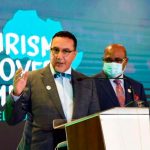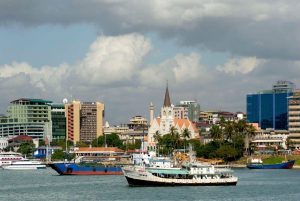As the rich world speeds ahead with vaccinations, developing countries – including those that did a good job at controlling the pandemic early on – look set to be hit with increasingly stringent travel restrictions that could affect their citizens for a long time.
The debate around the implications of vaccinated-related travel rules heated up as it was announced that the India-made AstraZeneca vaccine, Covishield – which is produced by India’s Serum Institute and distributed across much of Africa through the EU-supported Covax programme – has not been included in the EU Digital Green Pass programme. (Specific European countries have since agreed to recognise it, including Ireland.)
Africa has the slowest vaccination rate in the world. Just 18 million Africans are fully vaccinated on a continent of 1.3 billion people. But those in charge of procuring vaccines say rich countries have pushed their way to the front of the queue and taken control of production assets, denying the developing world a proper chance to get what is needed.
They are frustrated seeing politicians in wealthy countries talking about administering third doses to their citizens, rather than sharing what they have with the rest of the world.
“[There are] vaccine production centres across Europe. Not a single dose, not one vial has left a European factory for Africa,” charged Strive Masiyiwa, the African Union special envoy and Zimbabwean telecommunications billionaire tasked with leading efforts to procure Covid-19 vaccines, recently. “When we’ve gone to talk to their manufacturers, they tell us that they are completely maxed out, meeting the needs of Europe…They have vaccinated so many of their own people that they can now watch football without masks.”
“Now is the time for Europe to open up its production facilities so that we can buy vaccines,” he said.
Most African countries were quick to impose border controls and other restrictions in March 2020, greatly limiting the spread of the disease. To date, the UK has recorded almost the same number of deaths as the whole of Africa. However, the arrival of the Delta variant has caused a surge in cases. Over the past week, the continent recorded 6,273 deaths, a rise of 43 per cent on the 4,384 deaths of the previous week. Five countries – Namibia, South Africa, Tunisia, Uganda and Zambia – accounted for 83 per cent of new cases. Hospital admissions are increasing and some countries are facing shortages of oxygen and intensive care beds, while there are concerns about under-testing and unrecorded deaths.
One of the fastest increases has been in Uganda. The east African country of roughly 44 million people is back in a nationwide lockdown, while the WHO said the Delta variant was detected in 97 per cent of new cases. This week, Ugandan government minister Chris Baryomunsi told the Guardian newspaper that Uganda is unable to get further vaccinations, after giving shots to more than one million people.
“The problem has been the supply side,” he said. “We have the money but we simply can’t get the vaccine. This is a challenge of access and equity. We have to rely on the western world and the western world has focused on its population. The impression is that people there don’t care about Africans.”
In January John Nkengasong, the director of the Africa Centers for Disease Control and Prevention, said he was surprised African countries were being put on European travel ban lists while countries with much greater numbers of cases, like the US and France, remained off them. “From a public health standpoint, what we should be doing is requiring that people travel with a negative Covid-19 test,” he said. “If an African is traveling to the UK and shows a negative Covid test, that person doesn’t cause a risk to you.”
But fears are growing that the continent could be facing years of travel restrictions and bans hindering travel to the West, which would affect everyone from students and business people to Africans accessing medical care. Last month, Nkengasong appealed to G7 leaders to be on the “right side of history”, saying the limited supply of vaccines for Africa will have serious economic as well as health consequences.
Kenyan author Nanjala Nyabola, who recently published the book Travelling While Black, which was inspired by travels to 70 countries, said she believes extra restrictions imposed on African travellers could last far longer than the pandemic.
“Most African countries will not hit 30 per cent [of people vaccinated] until 2023, and that means that we will not hit 70 per cent until 2025. So, what they’re effectively saying is that they’re going to ban African travellers from certain countries until 2025. And once that becomes established as practice, how many years will it take to undo that?”
She said it is important to ensure racist policymaking does not take over at a time like this.
“The UK has a much more out of control outbreak than most African countries, but we are on red lists, and we have to carry that scarlet letter, but it’s almost never likely going to happen in the other direction.”
Source: The Irish Times






